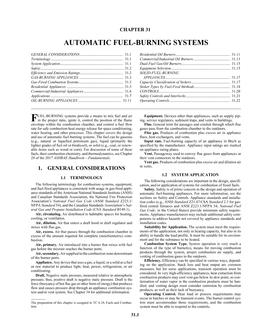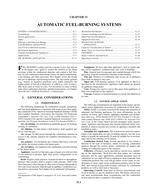
S31 — Automatic Fuel-Burning Systems (I-P)
- Comments Off on S31 — Automatic Fuel-Burning Systems (I-P)
- ASHRAE
Fuel-burning systems provide a means to mix fuel and air in the proper ratio, ignite it, control the position of the flame envelope within the combustion chamber, and control a fuel flow rate for safe combustion-heat energy release for space conditioning, water heating, and other processes. This chapter covers the design and use of automatic fuel-burning systems. The fuel can be gaseous (e.g., natural or liquefied petroleum gas), liquid (primarily the lighter grades of fuel oil or biodiesel), or solid (e.g., coal, or renewable items such as wood or corn). For discussion of some of these fuels, their combustion chemistry, and thermodynamics, see Chapter 28 of the 2013 ASHRAE Handbook—Fundamentals.
GENERAL CONSIDERATIONS
Terminology
System Application
Safety
Efficiency and Emission Ratings
GAS-BURNING APPLIANCES
Gas-Fired Combustion Systems
Residential Appliances
Commercial-Industrial Appliances
Applications
OIL-BURNING APPLIANCES
Residential Oil Burners
Commercial/Industrial Oil Burners
Dual-Fuel Gas/Oil Burners
Equipment Selection
SOLID-FUEL-BURNING APPLIANCES
Capacity Classification of Stokers
Stoker Types by Fuel-Feed Methods
CONTROLS
Safety Controls and Interlocks
Operating Controls
ISBN: 978-1-947192-52-2 (for I-P versions of chapters)
ISSN: 1078-6066 (for I-P versions of chapters)
Citation: 2020 ASHRAE Handbook — HVAC Systems and Equipment
Product Details
- ISBN(s):
- 9781947192522
- Number of Pages:
- 23
- Units of Measure:
- I-P
- File Size:
- 1 file , 1.5 MB
- Product Code(s):
- D-S312020IP


